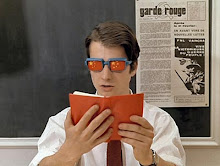Please excuse the enthusiastic intensity found below, but Orson Welles always gets me worked up into a lather of appreciative prose; if you take it in the spirit of those prophets from the long gone days of the CAHIERS DU CINEMA and their American counterpart Andrew Sarris, that would be just great. This post begins a hopefully permanent fixture in the wrinkles of this here modest blog, a documentation and examination of The Criterion Collection's immeasurable service to film lovers everywhere (or at least those non-U.S. residents with Region Free disc players and deep pockets), approached from the powerful authority of a random list generator. Eclipse titles are happily included in the spirit of titanic, insurmountable endeavor; films and filmmakers I love, like, don't know and approach with varying levels of antipathy. I've already completed three future posts with more to follow, so they should be coming with a fair amount of frequency. The only exception will be the Criterion titles released by Jean-Luc Godard, whose filmography I want to approach seperately and in chronological order. There will continue to be other non-Criterion enteries into the Auteur Files (I am preparing one on TAXI DRIVER for instance), but this addition should help counter-balance the dominant musical focus of this space. If I could just get cracking on literature and visual art themed entries, this place might shape up into the playground I desire it to be....
As with any truly great artist, the restrictions of budget cannot contain the possibilities of imagination: compromise when necessary, but keep filming keep moving keep working. What we get, at least in this version, is an enthralling complexity of voiceovers, flashbacks, ellipses and montage telling the tale of one greedy low-rent schmuck, a self-interested patsy straight out of a fatalistic dog-eared dime-store paperback, trying to find truth in a sea of lies, with the obvious fakery of Welles’ getup amplifying the falsehoods to the brink of absurdity. Absurdity? You want absurdity? Herein are flashes of both Kafka and Beckett intertwined with Jim Thompson’s lurid pulpiness. Also; a drunken woman floundering erratically around in a seesawing boat, a vessel that seems to be caustically mocking her state of inebriation, and two additions to the canon of great cinematic parties, one Goya-masked the other maze-like, both ranking up there with the revelry found in LA DOLCE VITA, LAST YEAR AT MARIENBAD, POINT BLANK, THE GODFATHER PART II and EYES WIDE SHUT.
I can rhapsodize on how Welles expertly arranges bodies in the frame, creating a kinetic symmetry that’s intensified by the relentless cutting and the captivatingly frustrating soundtrack (dubbing has never sounded, felt, so purposely/purposefully messy), or I can instead simply wax enthusiastic over sunglasses, masquerade masks, or the ominous stubble on the jowls of a dying man. In the midst of Welles’ typically grandiose intentions, it is the small gesture, the minor flourish, the succession of cumulative afterthoughts that ultimately elevate this tawdry bit of Shakespearian noir gone soap-operatically bonkers up to the level of sublime. And as the progression of its frames’ increasingly diagonal perspective unfolds it becomes bluntly obvious: Welles was incapable of making a bad film, even when faced with the disdain, hostility or disinterest of a business machine that as the decades unwound grew increasingly at odds with the slippery modernity of his genius. MR. ARKADIN was made in Europe, on the lam and on the cheap, but when a salty, brassy broad gets overcome with the bizarre ritualism of a religious parade and utters in exasperation “What gives with these crazy Ku Kluxers?” it feels boldly out of place for a film of this vintage, the sort of line that never would have made it past the first draft of a Hollywood script of the period, and this drives home a clear point that too few people understand: that Exile can offer up its own brand of Freedom, providing the liberating possibility to reference the diseased ideology of the Klan, to proffer a snapshot of a nude body washed up on the beach, or to call a junky a junky.







No comments:
Post a Comment